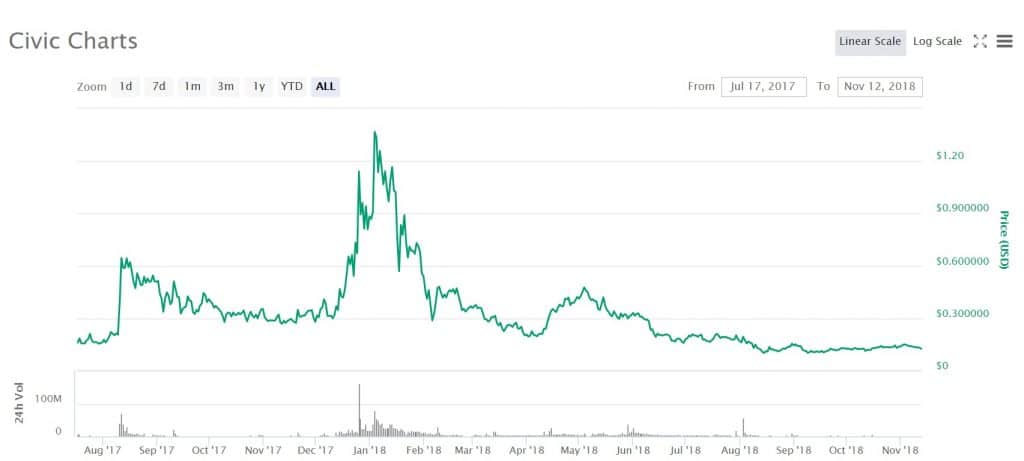Sunday, 21 October 2018
I arrive at The Venetian Hotel in Las Vegas. It is a spectacular building that looks like a mix between an arcade and the Sistine Chapel. The event is well arranged, 10/10 in professionalism. Much more well-managed than any other conference I’ve been to.
Since there were no presentations in the morning that had blockchain focus, I decided to focus on networking instead.
I meet a 50-year-old woman who tells me that she is an advisor for a startup that has developed a gadget that detects breast cancer at an early stage. She shows me a video on her mobile phone. The gadget is a thermal camera that you connect to your iphone and then it scans the chest for anomalies.

Then it comes, from nowhere.
The video voice says: “The app removes any semblance of your body or breasts from the photo. Blockchain security and image manipulation meaning your information are secure and no potentially embarrassing photos are kept on your phone”.
A thousand thoughts run through my head. How does a blockchain secure information? Is this all about back-ups? Why have they used a blockchain to make back-ups? The woman’s lips still move but I do not hear anything. In my head, I fall. I exercise restraint and say nothing. The conference has now begun.
“The woman’s lips still moves but I do not hear anything”
Is blockchain the future of digital identity?
Sunday, October 21, 2018, 2:40pm – 3:10pm
The Vault at Titian Ballroom, Level 2
In a time when identity politics is flourishing, the question has never been as interesting – who are we? And who will have the right to decide it? The obvious answer to these questions is “ask the blockchain”. At least if Vinny Lingham is allowed to decide, he who raised just over $33 million during an ICO last year in order to realize this particular concept. But the interesting thing is not how much money he raised, the interesting thing is what he has sold. It was not shares in his company, but “CVC tokens”.
Vinny imagines that his identity app should lay the foundation for a very own microeconomy where people are rewarded and buying services with CVC tokens. According to Vinny, it was necessary to create a whole new currency for this, and the reason was not that Vinny wanted to raise $33 million without selling as much as a promille’s share of his company, but instead, they said the CVC token would be “less volatile than other cryptocurrencies”.

The focus for Vinny and his stage partner, Bruce Silcoff, CEO at Shyft, seems to be that the problem of identity today is that the big business owners own our identities and sell our information to the highest bidder. And with blockchain technology, you should be able to “securely share data”, that is to choose which data you want to share with the sites you choose to visit. A strange statement, since you can not choose who you are sharing your data with on a blockchain. The whole point with blockchains is that everyone shares their data with everyone. If you want to encrypt the information you put on a blockchain, you should ask yourself why the information was added to it in the first place.
At present, there is only a certain type of encryption of content that can be performed on blockchains, and it is, for example, used in the anonymous cryptocurrency zcash. But that kind of cryptography can only be used to prove certain inherent mathematical properties of the transactions and is not really something that can be applied to personal data or things alike.
In the end, Vinny gets the question from the audience what the purpose of the blockchain is in regards to identity management. The answer is that it’s very good to have private keys because they’re something that you can own yourself and that you can sign things with, without having to rely on a third party. I note that this is an argument for private keys, and has nothing to do with blockchains.
But my suspicion proves futile. Silcoff proclaims: by mid-2019, Bermuda will start using Shyft’s decentralized interoperability-adapted identity solution!
“I walk out of the conference with an empty expression on my face”
I walk out of the conference hall with an empty expression on my face. Then I walk aimlessly. There is a giant room inside the conference, where different booths are set up from giants like Mastercard, Visa, Bank of America, Citi and Samsung. Suddenly a booth from dash pops up.

As we all know, dash is one of the biggest and most popular cryptocurrencies available. The twelfth biggest. But the question is, of course, how can a so-called decentralized cryptocurrency buy a booth at a conference like Money 20/20 – which costs tens of thousands of dollars? Isn’t dash supposed to be a protocol that nobody owns on which one can transfer money?
Is it not as strange as if the protocol HTTP had bought a houseboat? No, as most people do not know, dash has actually formed a company. They have a CEO. His name is Ryan Taylor, and he is also here at the conference.
The ownership of dash is extremely centralized
Dash sponsors itself for this kind of activities by voting and printing new money. However, the ownership of dash is highly centralized due to some issues with how dash was initially launched, which means that there is an imminent risk that dash ironically is controlled by a concentrated elite.
I go back to my hotel room and write a tweet storm about this subject.
How does a decentralized currency decide it's going to pay for a huge conference booth and become a 5-star sponsor of one of the most high-profile FinTech conferences in the world? Short thread 👇 pic.twitter.com/8m0y1VN0c2
— Eric Wall | OP_😺 (@ercwl) October 22, 2018
Since there are people who probably consider this kind of criticism to be old news, I will offer some other news about dash I managed to hear during the conference:
- 250 new merchants begin to accept dash payments each week.
- Dash now has about 500,000 users.
- A debit card with dash (and also bitcoin cash) as a means of payment is launched by the startup Fuzex.
- Kripto mobile sells a mobile phone in Venezuela that comes pre-loaded with dash.
The news was provided by Ryan Taylor himself.
“I go back to my hotel room and write a tweet storm about this subject”
Monday 22 October 2018
Debate: will blockchain replace today’s payments platforms?
Monday, October 22, 2018, 10:10am – 10:40am
The Vault at Titian Ballroom, Level 2
Here, David Schwartz, CTO at Ripple (third biggest cryptocurrency), is debating against Esther Pigg in an Oxford-style debate. I have no idea who Esther Pigg is but for those who know about “nocoiner”, that term describes the impression I got from her quite well. It’s really not wrong to be blockchain skeptic, but basing all of one’s rhetoric on headlines, government reports, Jamie Dimon or Nouriel Roubini will not lead to anything.
Schwartz and Pigg are unfortunately talking past each other and nothing of value arises during the debate.
Industry Night by Google
OMNIA Nightclub
On the street, there are showgirls, meaning women in lingerie and high heels with big angel wings who want you to take a picture with them for money, and other people who either want you to take a limousine to a strip club or order an escort to your hotel room.
Through this swarm, I march to Caesars Palace, where Money 20/20 has booked a whole nightclub for the conference visitors where the world-class rapper T-Pain will perform. As I’ve understood it, this is apparently not an unusual thing in the United States. For example, Ripple has hired Snoop Dogg at one of their corporate parties.
Both good and bad
Conferences of this kind are filled with the most awkward meetings of people I can imagine, so it’s a surreal feeling to suddenly be in a nightclub environment with these people. One thing that is both good and bad for me during this conference is that there is only a small amount of people that really know about blockchain or is interested in the subject.
What’s good is that I get insight into how the blockchain movement is perceived by normal people in nearby industries (incredibly mixed!). What’s bad is that it’s getting much harder to get something out of networking with random people.
Against all these odds, the party turns out to be pretty vibrant. There is a free bar in four different places, and the bartenders serve drinks as if they were trained mercenaries. I become friend with an Indian big blocker (bitcoin cash advocate) and the night ends in the morning hours somewhere along the Las Vegas blackjack tables.
“It’s a surreal feeling to suddenly be in a nightclub environment with these people”
Tuesday 23 October 2018
Privacy & Security in the Digital Age
Tuesday, October 23, 2018, 9:00am – 9:30am
Cyber Dome at Murano Ballroom, Level 3
For me, this is perhaps the highlight of the conference. From the first sight of the Christmas-old elder man in the white beard on stage, one couldn’t guess – but there is actually the so-called godfather of anonymous communication, David Chaum, whose work laid the foundation for the cypherpunk movement, which is the root of almost everything that has to do with cryptocurrencies.
For example, we have the mixed network Chaum designed in the 80’s to thank for that we have things like the Tor network today. As a university student, I have faithfully studied his work in digital signatures and cryptographic money systems and solutions.
Today, I’m a bitcoin nerd. Over the years, I have studied the weaknesses of the bitcoin protocol from a variety of angles of attack and experience a rather good grasp of what types of constraints the system is suffering from and the overall modern knowledge about how these constraints could be addressed.
David Chaum, cryptography’s own Albus Dumbledore, begins to talk:
“There’s a generally believed tradeoff in the cryptocurrency space between privacy and scalability and distributedness and maybe security. However, this is based on the current set of building blocks that are used to create these cryptocurrencies, and a few years ago I developed some fundamentally new cryptography that’s been presented and refereed at conferences and so forth, that’s now pretty widely accepted by the technical community, that actually breaks all of these tradeoffs.
So now we’ve built and have been running – privately – “elixxir”, a cryptocurrency that can easily do hundreds of thousands of transactions per second and has a quantum resistant level of security and also protects privacy in a way that I think is now the more important way which is the unlinking of the IP address and MAC address to the transactions, and it can also unlink the transactions to each other. So we kind of knocked the ball out of the park in this sense and changed the whole game. Some fundamental breakthroughs in cryptography and I think that this is something that is not widely recognized yet and I’m happy to have the chance to mention it.”
I have to record this on my mobile phone and then listen to it several times to hear exactly what he said. I have spent the last few years of my life analyzing the scalability of different cryptocurrencies. I know that it is not possible to make hundreds of thousands of transactions per second and still expect each network node to process each transaction. There must be something that’s wrong here.
But at the same time, it’s David Chaum. If he says so then it must be right? He says that he has developed a fundamentally new kind of cryptography that made it possible.
“I can’t stop thinking about what I’ve just heard”
I have a hard time focusing during the rest of the day. I can’t stop thinking about what I’ve just heard. Everything else just becomes unimportant. If Chaum is right, it means I have to let go of everything I’m doing right now and dedicate my full energy to study elixxir. I start sneaking at elixxir’s website and find a technical overview of the technology.
Given the importance of Chaum’s heritage, it’s really absurd that one have not heard more about this. How can this not be the only thing everyone talks about on the forums and on Twitter? I hardly find a single Twitter thread that discusses it. So I start to tweet while reading, as I want as much external input as possible.
You can read the thread here.
Going to think loudly while I read David Chaum's @elixxir_io technical brief. Chaum is pretty much the forefather anonymous communication and is about as respected as you can be in this space. Now he's built a privacy PoS coin. I'll look silly criticizing this but, here I go.
— Eric Wall | OP_😺 (@ercwl) October 24, 2018
In the thread, Rick Carback shows up (co-founder of elixxir) and gives answers to my comments. Rick, in turn, gets attacked by Vitalik Buterin, the founder of ethereum. And this will probably how it will look like in the months to come: elixxir will be dissected, analyzed, criticized, copied and attacked from all directions. It is the “survival of the fittest” match that all cryptocurrency projects embarks when introduced into this world. Final judgment for elixxir remains to be seen.
Wednesday 23 October 2018
Blockchain, celebrity & social impact: Akoin Powers a new stable currency
Wednesday 23 October 2018, 10:55am – 11:05am
Revolution Stage at Venetian Ballroom, Level 2
When I saw that Akon would come to Money 20/20, I thought he would perform together with T-Pain, but I was completely wrong. Akon is apparently such a human transformer there are few of, like Arnold Schwarzenegger who went from Mr. Olympia to Hollywood celebrity to California governor. Akon, in turn, has apparently gone from car thief to Grammy winner to cryptocurrency founder.
Akon’s cryptocurrency is called akoin. However, the presentation is not very much about what akoin really is, but about Akon himself and how he worked for many years as a visionary and philanthropist, and how he started, among other things, “Akon lighting Africa project” that installed solar energy systems in 18 African countries. So I’ll have to dig a little on my own.

My biggest interest is of course technical. I try to find out if they are going to develop a brand new platform or use an existing one, and who the developers that are building the cryptocurrency are. The website shows twelve founders and advisors, but no developers. This may explain why there is also no technical description of the project (no whitepaper or other documents).
On their blog, I find out that akoin is not just about creating a cryptocurrency for Africans, but they are going to build a whole new city called “Akon crypto city”, located on the 800 acres of land that Akon should have received as a gift from the Senegalese government. In that city, akoin will be the main currency. Akoin has also entered into a partnership with Lottery.com, and two of the founders of Lottery.com are also in the akoin team.
“With Lottery.com, we’re able to provide immediate access to real resources like training and business capitalization to help young entrepreneurs supercharge their business and exchanges. That’s how you change the game for future generations. That’s how we bring young people up out of poverty and help them take charge of their own destinies”, Akon said.
Like a tivoli
I’m leaving The Venetian and Money 20/20 with a blank facial expression. In this post, we’ve just scratched the surface of all that I’ve seen in these dizzying four days. It feels like I’ve been to a tivoli; everything has been extremely entertaining, but I’ve got too much cotton candy and now I am nauseous and tired.
I remind myself that the birth of a new industry probably isn’t something that happens that many times during one’s working life, so it’s important to appreciate the privilege of witnessing the spectacle sitting in front row while it happens.
With that, I say thank you. Invest smart and DYOR (do your own research).
Eric Wall,
Head of cryptocurrencies at Cinnober and reporter for Trijo News at Money 20/20 in Las Vegas 2018





